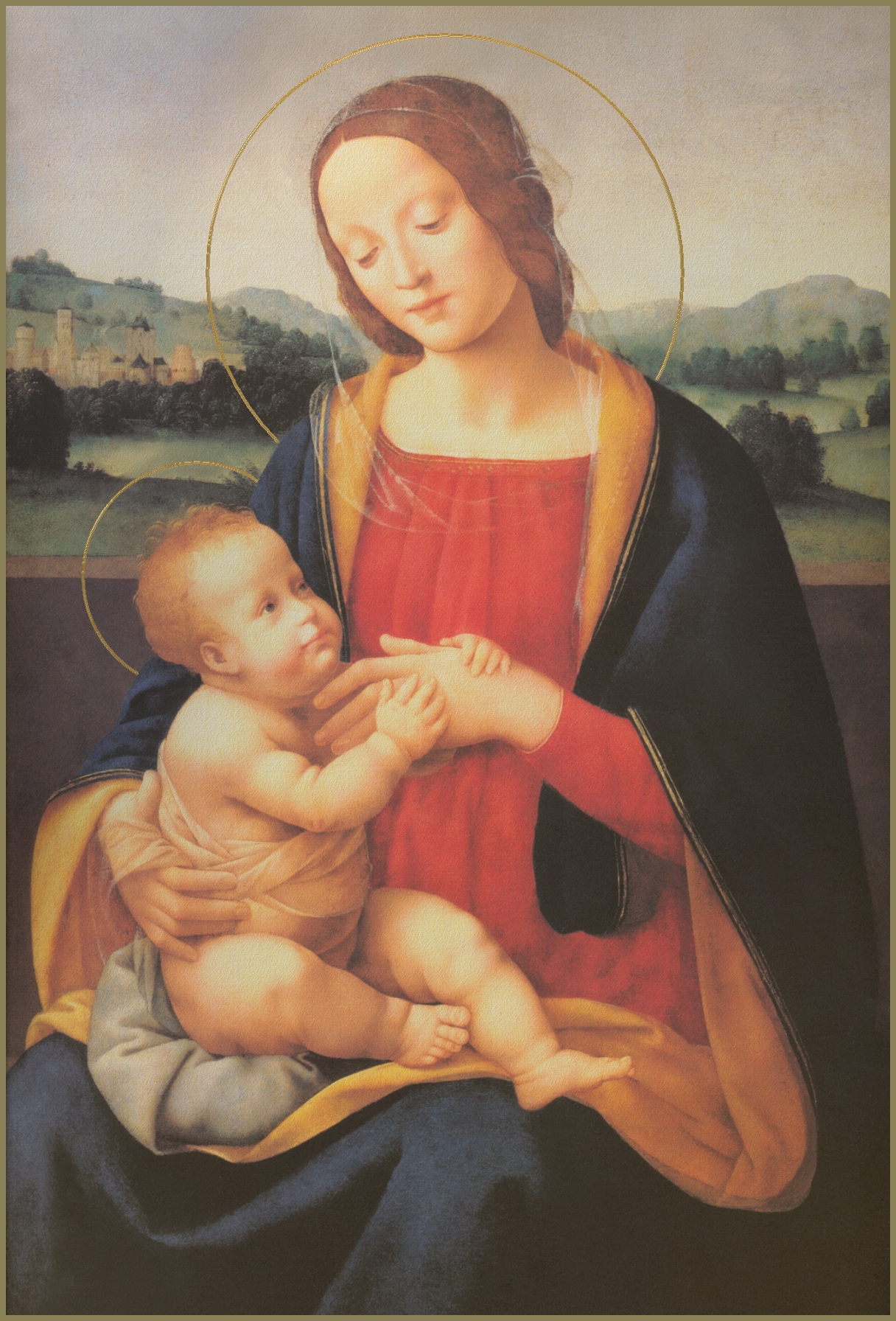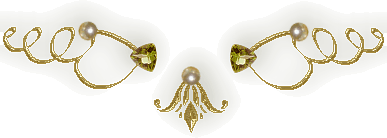
Madonna and Child
SOGLIANI
1492-1544


Excerpt From
The Glories of Mary
St. Alphonsus de Liguori
Redemptorist Fathers, 1931
with Nihil Obstat and Imprimatur
Published on the Web with Permission
Mary, Our Life, Our Sweetness
III. Mary is our Sweetness, Because She Renders Death Sweet to Her Clients.
"He that is a friend loveth at all times; and a brother is proved in distress," says the Book of Proverbs. [17:17] We can never know our friends and relatives in the time of prosperity; it is only in the time of adversity that we see them in their true colors. People of the world never abandon a friend as long as he is in prosperity; but should misfortunes overtake him, and more particularly should he be at the point of death, they immediately forsake him. Mary does not act thus with her clients. In their afflictions, and more particularly in the sorrows of death, the greatest that can be endured in this world, this good Lady and Mother not only does not abandon her faithful servants, but as during our exile she is our life, so also is she at our last hour our sweetness, by obtaining for us a calm and happy death. For from the day on which Mary had the privilege and sorrow of being present at the death of Jesus her Son, Who was the head of all the predestined, it became her privilege to assist also at their deaths. And for this reason the holy Church teaches us to beg this most blessed Virgin to assist us, especially at the moment of death: "Pray for us, sinners, now and at the hour of our death! Oh, how great are the sufferings of the dying! They suffer from remorse of conscience on account of past sins, from fear of the approaching judgment, and from the uncertainty of their eternal salvation. Then it is that Hell arms itself, and spares no efforts to gain the soul which is on the point of entering eternity; for it knows that only a short time remains in which to gain it, and that if it then loses it it has lost it forever. "The devil is come down unto you, having great wrath, knowing that he hath but a short time." [Apoc. 12:12] And for this reason the enemy of our salvation, whose charge it was to tempt the soul during life, does not choose at death to be alone, but calls others to his assistance, according to the prophet Isaias: "Their houses shall be filled with serpents." [Is. 13:21] And indeed they are so; for when a person is at the point of death, the whole place in which he is is filled with devils, who all unite to make him lose his soul.
It is related of St. Andrew Avellino that ten thousand devils came to tempt him at his death. The conflict that he had in his agony with the powers of Hell was so terrible that all the good religious who assisted him trembled. They saw the Saint's face swelled to such a degree from agitation that it became quite black, every limb trembled and was contorted; his eyes shed a torrent of tears, his head shook violently; all gave evidence of the terrible assault he was enduring on the part of his infernal foes. All wept with compassion, and redoubled their prayers, and at the same time trembled with fear on seeing a Saint die thus. They were, however, consoled at seeing that often, as if seeking for help, the Saint turned his eyes towards a devout picture of Mary; for they remembered that during life he had often said that at death Mary would be his refuge. At length God was pleased to put an end to the contest by granting him a glorious victory; for the contortions of his body ceased, his face resumed its original size and color, and the Saint, with his eyes tranquilly fixed on the picture, made a devout inclination to Mary (who it is believed then appeared to him), as if in the act of thanking her, and with a heavenly smile on his countenance tranquilly breathed forth his blessed soul into the arms of Mary. At the same moment a Capuchiness, who was in her agony, turning to the nuns who surrounded her, said, " Recite a Hail Mary; for a Saint has just expired."
Ah, how quickly do the rebellious spirits fly from the presence of this Queen! If at the hour of death we have only the protection of Mary, what need we fear from all our infernal enemies? David, fearing the horrors of death, encouraged himself by placing his reliance on the death of the coming Redeemer and on the intercession of the virgin Mother. "For though," he says, " I should walk in the midst of the shadow of death, . . . Thy rod and Thy staff, they have comforted me." [Ps. 22:4] Cardinal Hugo, explaining these words of the Royal Prophet, says that the staff signifies the Cross, and the rod is the intercession of Mary; for she is the rod foretold by the prophet Isaias: "And there shall come forth a rod out of the root of Jesse, and a flower shall rise up out of his root." [Is. 11:1] "This Divine Mother," says St. Peter Damian, "is that powerful rod with which the violence of the infernal enemies is conquered." And therefore does St. Antoninus encourage us, saying, "If Mary is for us, who shall be against us?"
When Father Emanuel Padial, of the Society of Jesus, was at the point of death, Mary appeared to him, and to console him she said: "See at length the hour is come when the Angels congratulate thee, and exclaim: O happy labors, O mortifications well requited! And in the same moment an army of demons was seen taking its flight, and crying out in despair: Alas! we can do naught, for she who is without stain defends him." In like manner, Father Gaspar Haywood was assaulted by devils at his death, and greatly tempted against faith; he immediately recommended himself to the most blessed Virgin, and was heard to exclaim, " I thank thee, Mary; for thou hast come to my aid."
St. Bonaventure tells us that Mary sends without delay the prince of the heavenly court, St. Michael, with all the Angels, to defend her dying servants against the temptations of the devils, and to receive the souls of all who in a special manner and perseveringly have recommended themselves to her. The Saint, addressing our blessed Lady, says, "Michael, the leader and prince of the heavenly army, with all the administering spirits, obeys thy commands, O Virgin, and defends and receives the souls of the faithful who have particularly recommended themselves to thee, O Lady, day and night."
The prophet Isaias tells us that when a man is on the point of leaving the world Hell is opened and sends forth its most terrible demons, both to tempt the soul before it leaves the body, and also to accuse it when presented before the tribunal of Jesus Christ for judgment. The prophet says, " Hell below was in an uproar to meet thee at thy corning; it stirred up the giants for thee." [Is. 14:9] But Richard of St. Laurence remarks that when the soul is defended by Mary the devils dare not even accuse it, knowing that the Judge never condemned, and never will condemn, a soul protected by His august Mother. He asks, "Who would dare accuse one who is patronized by the Mother of Him Who is to judge?" Mary not only assists her beloved servants at death and encourages them, but she herself accompanies them to the tribunal seat of God. As St. Jerome says, writing to the virgin Eustochia, "What a day of Joy will that be for thee, when Mary, the Mother of Our Lord, accompanied by choirs of virgins, will go to meet thee." The Blessed Virgin assured St. Bridget of this; for, speaking of her devout clients at the point of death, she said, "Then will I, their dear Lady and Mother, fly to them, that; they may have consolation and refreshment." St. Vincent Ferrer says, that not only does the most blessed Virgin console and refresh them, but that "she receives the souls of the dying." This loving Queen takes them under her mantle, and thus presents them to the Judge, her Son, and most certainly obtains their salvation: This really happened to Charles, the son of St. Bidget, who died in the army, far from his mother. She feared much for his salvation on account of the dangers to which young men are exposed; in a military career; but the Blessed Virgin revealed to her that he was saved on account of his love for her, and that in consequence she herself had assisted him at death, and had suggested to him the acts that should be made at that terrible moment. At the same time the Saint saw Jesus on His throne, and the devil bringing two accusations against the most blessed Virgin: the first was, that Mary had prevented him from tempting Charles at the moment of death; and the second was, that the Blessed Virgin had herself presented his soul to the Judge, and so saved it without even giving him the opportunity of exposing the grounds on which he claimed it. She then saw the Judge drive the devil away, and Charles's soul carried to Heaven.
Ecclesiasticus says, that "her bands are a healthful binding," [6:31] and that "in the latter end thou shalt find rest in her." [6:29] Oh, you are indeed fortunate, my brother, if at death you are bound with the sweet chains of the love of the Mother of God! These chains are chains of salvation; they are chains that will insure your eternal salvation, and will make you enjoy in death that blessed peace which will be the beginning of your eternal peace and rest. Father Binetti, in his book on the perfections of our blessed Lord, says, "that having attended the death-bed of a great lover of Mary, he heard him, before expiring, utter these words: 'O my father, would that you could know the happiness that I now enjoy from having served the most holy Mother of God; I cannot tell you the joy that I now experience.' " Father Suarez (in consequence of his devotion to Mary, which was such that he used to say that he would willingly exchange all his learning for the merit of a single "Hail Mary") died with such peace and joy that in that moment he said, "I could not have thought that death was so sweet;" meaning, that he could never have imagined that it was possible, if he had not then experienced it, that he could have found such sweetness in death.
You, devout reader, will, without doubt, experience the same joy and contentment in death if you can then remember that you have loved this good Mother, who cannot be otherwise than faithful to her children who have been faithful in serving and honoring her, by their visits, Rosaries, and fasts, and still more by frequently thanking and praising her, and often recommending themselves to her powerful protection. Nor will this consolation be withheld, even if you have been for a time a sinner, provided that, from this day, you are careful to live well, and to serve this most gracious and benign Lady. In your pains, and in the temptations to despair which the devil will send you, she will console you, and even come herself to assist you in your last moments. St. Peter Damian relates that his brother Martin had one day offended God grievously. Martin went before an altar of Mary, to dedicate himself to her as her slave; and for this purpose, and as a mark of servitude, put his girdle round his neck, and thus addressed her: "My sovereign Lady, mirror of that purity which I, miserable sinner that I am, have violated, thereby outraging my God and thee, I know no better remedy for my crime than to offer myself to thee for thy slave. Behold me then: to thee do I this day dedicate myself, that I may be thy servant; accept me, though a rebel, and reject me not." He then left a sum of money on the step of the altar, and promised to pay a like sum every year, as a tribute which he owed as a slave of Mary. After a certain time Martin fell dangerously ill; but one morning, before expiring, he was heard to exclaim: "Rise, rise, pay homage to my Queen!" and then he added: "And whence is this favor, O Queen of Heaven, that thou shouldst condescend to visit thy poor servant? Bless me, O Lady, and permit me not to be lost, after having honored me with thy presence." At this moment his brother Peter entered, and to him he related the visit of Mary, and added that she had blessed him, but at the same time complained that those who were present had remained seated in the presence of this great Queen; and shortly afterwards he sweetly expired in Our Lord.
Such also will be your death, beloved reader, if you are faithful to Mary. Though you may have hitherto offended God, she will procure you a sweet and happy death. And if by chance at that moment you are greatly alarmed and lose confidence at the sight of your sins, she will come and encourage you, as she did Adolphus, Count of Alsace, who abandoned the world, and embraced the Order of St. Francis. In the chronicles of that Order we are told that he had a tender devotion to the Mother of God; and that when he was at the point of death his former life and the rigors of Divine justice presented themselves before his mind, and caused him to tremble at the thought of death, and fear for his eternal salvation. Scarcely had these thoughts entered his mind when Mary (who is always active when her servants are in pain), accompanied by many Saints, presented herself before the dying man, and encouraged him with words of the greatest tenderness, saying: "My own beloved Adolph, thou art mine, thou hast given thyself to me, and now why dost thou fear death so much?" On hearing these words the servant of Mary was instantly relieved, fear was banished from his soul, and he expired in the midst of the greatest peace and Joy.
Let us, then, be of good heart, though we be sinners, and feel certain that Mary will come and assist us at death, and comfort and console us with her presence, provided only that we serve her with love during the remainder of the time that we have to be in this world. Our Queen, one day addressing St. Matilda, promised that she would assist all her clients at death who, during their lives, had faithfully served her. "I, as a most tender mother, will faithfully be present at the death of all who piously serve me, and will console and protect them." O God, what a consolation will it be at that last moment of our lives, when our eternal lot has so soon to be decided, to see the Queen of Heaven assisting and consoling us with the assurance of her protection.
Besides the cases already given in which we have seen Mary assisting her dying servants there are innumerable others recorded in different works. This favor was granted to St. Clare; to St. Felix, of the Order of Capuchins; to St. Clare of Montefalco; to St. Teresa; to St. Peter of Alcantara. But, for our common consolation, I will relate the following: Father Crasset tells us, that Mary of Oignies saw the Blessed Virgin at the pillow of a devout widow of Willembroc, who was ill with a violent fever. Mary stood by her side, consoling her, and cooling her with a fan. Of St. John of God, who was tenderly devoted to Mary, it is related that he fully expected that she would visit him on his death-bed; but not seeing her arrive, he was afflicted, and perhaps even complained. But when his last hour had come, the Divine Mother appeared, and gently reproving him for his little confidence, addressed him in the following tender words, which may well encourage all servants of Mary: "John, it is not in me to forsake my clients at such a moment." As though she had said: "John, of what wast thou thinking? Didst thou imagine I had abandoned thee? And dost thou not know that I never abandon my clients at the hour of death? If I did not come sooner it was that thy time was not yet come; but now that it is come, behold me here to take thee; let us go to Heaven." Shortly afterwards the Saint expired, and fled to that blessed Kingdom, there to thank his most loving Queen for all eternity.

DOWNLOAD THE MADONNA UNTEXTURED
 E-Mail
E-Mail
HOME-------------------------------------MARY'S INDEX
www.catholictradition.org/Mary/mary9c.htm